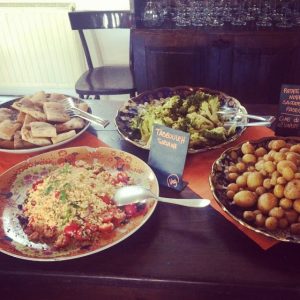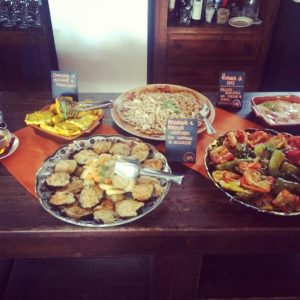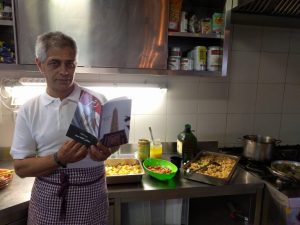Teaching, cooking, travelling and writing are the four verbs which belong to Saleh Ramadan, Cittadellarte’s coffee restaurant Crossquare’s new cook. Saleh, a 52 years old Egyptian, in not only an expert cook, but also a writer and a maths professor. The story that brought him to Biella is studded with many events which have led him to follow very different paths, allowing him to get to know both the Arab and the Western worlds.
The story
After gaining a degree in Maths and Psychology from Ilmnuofi, Saleh started his professional career working as a teacher in secondary schools. “The economic conditions were not favourable – he says – so I moved to Saudi Arabia, where teachers are better paid. Only five months after my arrival, in 1990, the First Gulf War broke out”. The conflict led Saleh to decide to leave for Europe. “After a brief spell in Austria – he continues – where I made a living distributing leaflets door to door, in October 1991 I arrived in Italy, in Rome, where I found work as a dishwasher in a restaurant. But it was in fact much more than that: the chef treated me like a son and taught me the secrets of Italian cooking, and I eventually started assisting him in the preparation of the dishes, including pizzas. That’s where my career as a cook started.
After twelve years in the capital, the restaurant where he worked closed. From then on, Saleh embarked on a “professional labyrinth”, keeping cooking as the fil rouge of his occupations. In 2009, following ten seasons in a hotel in San Martino di Castrozza in Trentino Alto Adige, he opened his own restaurant. “Unfortunately, my restaurant ‘Aeroplano’ didn’t work. They were times of crisis and I had to backtrack. I therefore started looking for a job again, publishing job seeking advertisements on newspapers. I was lucky, because I was contacted from Biella to work in catering for Carnotta Cernigliaro, the owner of the villa of same name.”
The arrival at the historic location, in Sordevolo, in the province of Biella, was an important step for the cook’s future: “After a while working there catering for events, in 2011 I decided to open in those very spaces the pizzeria ‘Fior di Farina’. Because of personal problems I then sold the business to Teo Refraschini, who opened the ‘Serra dei Leoni’. Even though it was sad to have to close that chapter of my life, I was happy it was Teo – Carlotta Cernigliaro’s son – to take over that venture. I consider them my second family. “Saleh’s travels continued: eight months in an Italian restaurant in Monaco, and then the return to Egypt following a bereavement. “Back in my country, I started working again as a teacher, but I met with a few difficulties. One day Teo called me, offering me to come back to Italy to work as a cook at Cittadellarte’s restaurant. I accepted straight away.”
What’s left of all your travelling? “When I was young, I used to dream of travelling to Europe. I have been extremely lucky to have had the opportunity to live two worlds, the Arab and the Western worlds.”

Crossquare and Cittadellarte
As mentioned, Saleh has been Crossquare’s new cook for a bit over a month. He talks about his impact with this new reality. “I’ve been impressed with Cittadellarte’s atmosphere from the very beginning. I got emotional when I met Pistoletto, his art has always struck a chord with me. Working here is extremely meaningful and stimulating. Besides – he says – being also a writer, and therefore interested in humanistic subjects, I feel comfortable here.”
What type of cooking will Saleh offer? “My cooking will be mainly vegetarian and international, considering that these are the two most appreciated types of food in this context. Every day – he explains – I include in the menu dishes from different countries, like Syria, Lebanon, Egypt, North Africa, and from different Italian regions. I don’t plan anything, every day I improvise, always offering a rich and diversified selection.”
The cook invites us to taste his specialities: “I recommend the tabala, a Lebanese salad prepared with grated spelt, cherry tomatoes, mint, Tropea onions, lemon juice and basil, parsley and celery. The baba ghannouj, a mousse of aubergine, is also worth trying. Also not to be missed is my home-made bread, and the cold pizza made with three different types of flour: soft wheat, wholegrain and soy.”


Books and politics
Saleh, in parallel with his travels and his job as a cook, has always cultivated a passion for reading and writing. He has published three books, and he is about to publish a fourth. His writing focuses on politics and the way it affects society in specific countries. His first three books, called ‘The Arab Spring’, ‘Islam and the Western World’ and ‘Egypt between two revolutions’ are written in Arab and sold in Egypt and, soon, in other Arab countries. The book he is still working on is called ‘Carpet weaver’.
“The first book – he says – is a political reflection on Islamic integralists, in which I explain how they have been supported on their path to power in the Arab world. I highlight the complexity of the situation people have to face; after Mubarack’s, Gheddafi’s and Benali’s leaderships, they now live in a religious dictatorship.
The second book deals with the macrophenomenon of Islamic fundamentalism: “In ‘Islam and the Western World’ I analyse jihadism. I point out how it was created three times in 80 years: in 1928, when British intelligence formed the movement ‘Muslim Brothers’; in 1978, the year in which the CIA instituted al-Qaida in Afghanistan; in 2003, when the Americans developed Isis in Syria. I want to make clear that my claims are not theories, but facts based on studies and testimonies I quote in the book.”
The writer also mentions the subjects investigated in the third and fourth books: “‘Egypt between two revolutions’ focuses on the history of Egyptian politics and its conflicts of power between 1952 and 2013, while ‘Carpet weaver’ is about Iran and Israel . I consider the latter a Western country that a wrong geography places in the Near East, which is the source of so many problems. Iran – he continues – is a very important civilization. To realize the greatness of this republic, you only have to consider the occupation of the population: Iranian people weave carpets, an activity requiring cleverness, pragmatism and patience, aspects which, in my opinion, reflect the social characteristics of this Asian country.
My next projects and aspirations – he concludes – are to write a novel and see my books published in Italian.”


